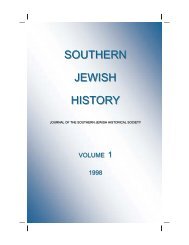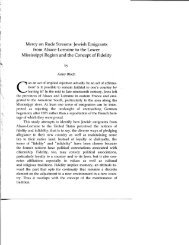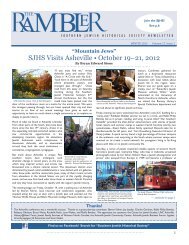A Shtetl Grew in Bessemer - Southern Jewish Historical Society
A Shtetl Grew in Bessemer - Southern Jewish Historical Society
A Shtetl Grew in Bessemer - Southern Jewish Historical Society
Create successful ePaper yourself
Turn your PDF publications into a flip-book with our unique Google optimized e-Paper software.
BARR/A SHTETL GREW IN BESSEMER 13<br />
with the Reform practices of the German Jews. But <strong>in</strong> towns<br />
where the eastern Europeans were the organizers of <strong>Jewish</strong> life,<br />
s<strong>in</strong>gle, Orthodox congregations were the rule. 58 <strong>Bessemer</strong>’s <strong>Jewish</strong><br />
life and temple seem to fall somewhere <strong>in</strong> the middle of these<br />
patterns. What is more important, however, is that <strong>Bessemer</strong>’s<br />
Jews did reunify after a relatively short period of time. Aga<strong>in</strong>,<br />
while the reasons for the reunification might have been that Reformers<br />
left <strong>Bessemer</strong>, many rema<strong>in</strong>ed. A city with a small <strong>Jewish</strong><br />
population, where everyone knew each other and shared socioeconomic<br />
position, simply could not support two congregations. 59<br />
<strong>Bessemer</strong>’s Jews, despite their differences, ma<strong>in</strong>ta<strong>in</strong>ed a bond<br />
based on “economic l<strong>in</strong>ks, k<strong>in</strong>ship, and religion.” 60<br />
The unity of religion, k<strong>in</strong>ship, and friendship was directly<br />
reflected <strong>in</strong> the activities of Charles We<strong>in</strong>ste<strong>in</strong> who, after emigrat<strong>in</strong>g<br />
from Russia, took his place <strong>in</strong> the life of the <strong>Jewish</strong><br />
community. As a boy Arnold Lefkovits viewed We<strong>in</strong>ste<strong>in</strong> as<br />
“a sort of rabbi” who conducted Passover seders for the Lefkovits<br />
and We<strong>in</strong>ste<strong>in</strong> families. 61 We<strong>in</strong>ste<strong>in</strong>’s granddaughter, Estelle<br />
Seigel Silverste<strong>in</strong>, remembers that her family kept kosher out<br />
of respect for Charles, not an easy th<strong>in</strong>g given that Charles<br />
himself was the only person <strong>in</strong> the town will<strong>in</strong>g and able to perform<br />
the ritual slaughter<strong>in</strong>g of the animals for meat and thus<br />
served as <strong>Jewish</strong> <strong>Bessemer</strong>’s unofficial “shokhet.” “On the holidays—Rosh<br />
Hashanah, Yom Kippur, and often Passover—<br />
my grandfather would see everyone come to his house to<br />
have him kill the chickens and make them kosher. There was<br />
no kosher butcher <strong>in</strong> <strong>Bessemer</strong>. We used to drive to Birm<strong>in</strong>gham<br />
to buy meats from Haimuvitz on Fourth Avenue. But dur<strong>in</strong>g<br />
the holidays Papa would kill the chickens, slit their necks,<br />
and throw them down <strong>in</strong> the yard.” 62 Marv<strong>in</strong> Cherner, later<br />
a Birm<strong>in</strong>gham circuit judge, was a member of one of the<br />
families who took “live chickens to Mr. We<strong>in</strong>ste<strong>in</strong> to have<br />
them slaughtered,” because, while his Russian-born grandparents<br />
lived with the Cherners, they did “observe the dietary<br />
laws.” 63<br />
In an extended household that <strong>in</strong>cluded Estelle Seigel Silverste<strong>in</strong>’s<br />
parents, grandparents, aunt, uncle (Milton “Buddy”







